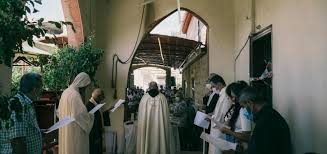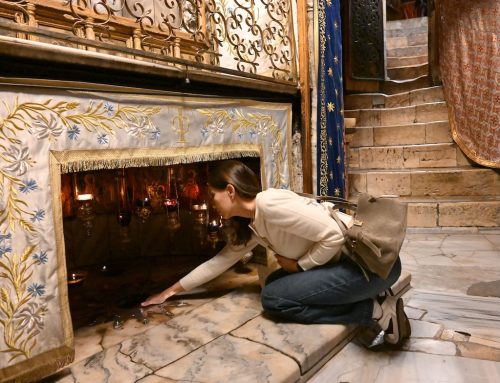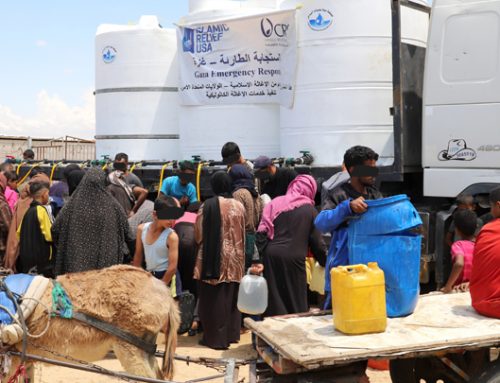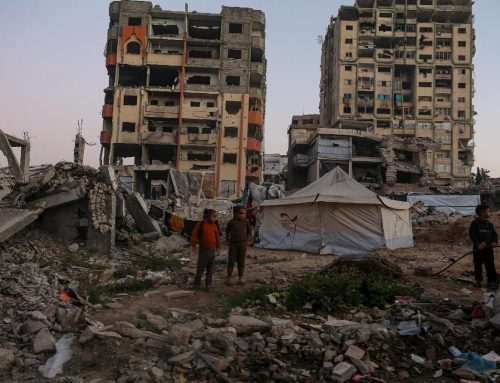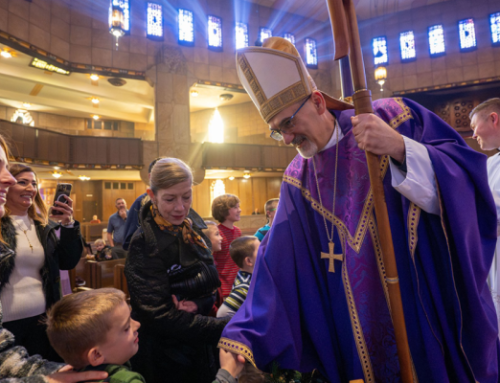Sfeir is responsible for one street in the hard-hit Karantina neighborhood, but she has been fixated on a single particular site: the blasted-out Maronite Christian church. She has been consumed by details of the century-old neighborhood landmark for weeks, from how to best reconstruct its sandstone walls to the ceiling’s intricate wooden arc. She has tried to incorporate more natural light for enhanced spirituality.
Sfeir’s 30-member team has promised to repair the church by Christmas Eve.
With the Lebanese government shirking responsibility for rebuilding the city, there is no grand plan. Instead, lives are being reconstructed brick by building by block. For months, charities have worked around-the-clock and around coronavirus curfews to rebuild bits of the broken city, racing to secure walls and return residents home before winter rains cause further damage.
In the immediate aftermath of the Aug. 4 explosion, which killed more than 200 people, Sfeir and others throughout Lebanon descended upon Beirut to clear the rubble, replace windows, offer emergency care, and house, clothe and feed the estimated 300,000 people who had been displaced. These workers rightly feared that the country’s entrenched political elite, dominated by former militia leaders enriched by sectarianism and the spoils of the civil war, would not come to the rescue.
Public faith in the government was running especially low because Beirutis blamed Lebanese authorities for failing to prevent the tragedy, even though they had been repeatedly warned over the years that 2,750 tons of ammonium nitrate was improperly stored at the port.
As politicians avoided the streets, the government tasked the more-popular army with coordinating reconstruction efforts. But in the four months since the blast, it has been local and international charities, reliant on donations from abroad, that have kept the recovery efforts going.
When the explosion erupted, Sfeir said she felt it in her hometown of Qlayaat, about 16 miles from Beirut. She was unemployed at the time and looking to leave Lebanon. Instead, by chance, she connected with Offrejoie, a Lebanese charity founded during Lebanon’s civil war. She decided to stay in Beirut to volunteer.
“There are people who on their own can’t get back up,” she said, amid the clinking and clanking of construction. “We are helping them stand.”
The hardest days, she said, are when construction materials are delayed. Or when it rains, interrupting work and exposing every crack still left to fix. Sometimes, Sfeir needs a day off to stay home and reboot. Then she is back at it.
“People are without windows. People are without doors. People have broken walls. People have water coming from the ceiling,” she said. “So, we have the goal of working faster and faster because the weather isn’t helping.”
Her favorite moments are when residents stop by to ask about the church’s progress, reminding her of the community at the heart of it all. She admires how dedicated people are to the church, inquiring about it before the status of their own homes.
And sometimes she panics: What if there’s another upheaval in the city and they cannot meet the Christmas Eve deadline? “I’m afraid that something will happen outside of my control,” Sfeir said.
Rebuilding Beirut is a daily battle. In the areas most severely affected by the blast, about 2,600 buildings were damaged and one-third of them heavily, according to Jad Tabet, president of the Order of Engineers and Architects of Beirut. These neighborhoods, representing nearly a quarter of the city, included many of Beirut’s famed cafes, bars and clubs. In the four months since, Tabet estimated, 20 percent at most of the damaged buildings have been fixed.
About $2.5 billion is immediately needed for reconstruction, according to international donors, while so far $5 million is at hand, Tabet said. Adding to the funding shortage is the challenge of accessing money from abroad — a logistical minefield because of the country’s banking crisis.
Earlier this month, France and the United Nations announced a new humanitarian aid fund, but they warned that billions of dollars would be held up if Lebanon’s politicians did not break their impasse and form a new government to undertake economic reforms.
So, even if windows or walls have been fixed, reconstruction remains far from complete. Few Lebanese can afford to replace everything they lost inside their homes, from ovens to bedroom doors.
“This is a country where the social arm of the state has been delegated to NGOs for quite a while,” said Mona Fawaz, professor of urban studies at the American University of Beirut (AUB). “That’s why it was normal to see some of the big NGOs in Lebanon jump in and do some admirable work.”
Yet, Fawaz warned, this will not be sufficient. “No one can replace the state as a custodian of the common good,” she said. Without proper urban planning, the recovery risks leaving the poor and disenfranchised behind.
Mohamad El Chamaa, 25, volunteered with Offrejoie in Karantina after the blast and now researches the neighborhood for his master’s degree at AUB. In those initial weeks, he recalled, the Karantina church served as a meeting place for volunteers, who congregated there to eat.
But he worries that once the initial round of renovations is complete, residents may not be able to afford to remain in their neighborhood.
The church “is an incentive for them to stay,” he said. “But will they have the power to stay? We are trying to make it so they can.”
For her part, Sfeir said she is ready to take on a new project in Beirut after the work at the church is finished. Then, eventually, she will return to building her own future, she said.
Sfeir holds no illusions about her long-term prospects in Lebanon. Tired of unfulfilled dreams here, she ultimately sees her future outside the country and, like so many Lebanese in her generation, longs to leave. While the Lebanese have long been praised for their resilience, she admits she has grown weary of the soaring poverty, unemployment and inflation, as well as the decades of government corruption and mismanagement. She wants more.
“When I feel that this city is able to return to standing on its legs, I’ll travel to find my future because I won’t have a future in this country,” she said.
As for when that would be, she offered no deadline.

